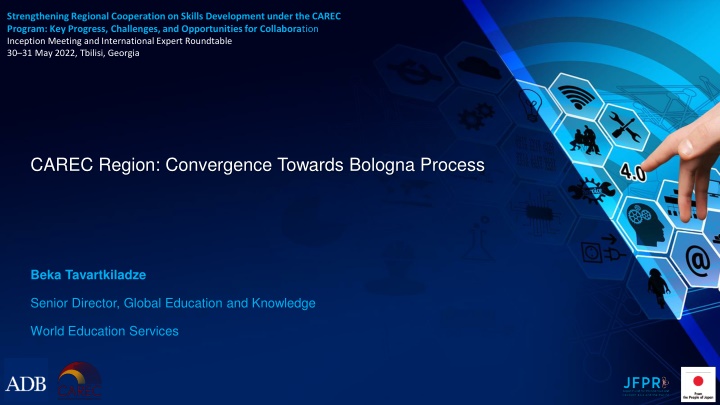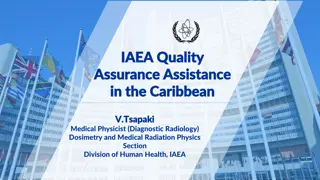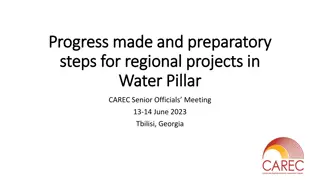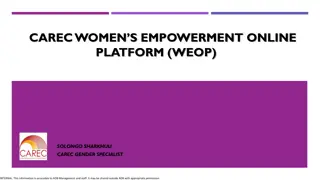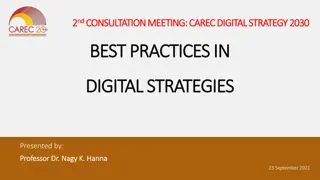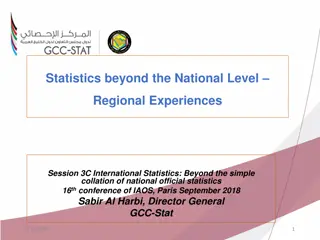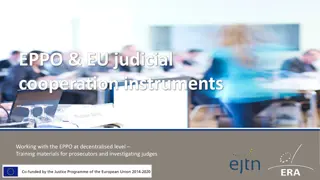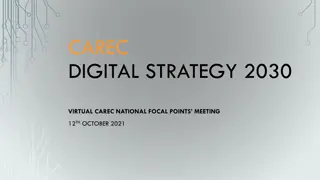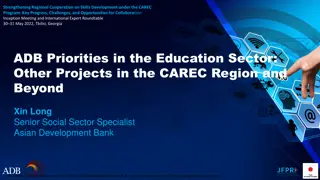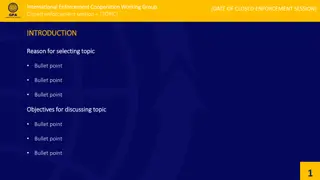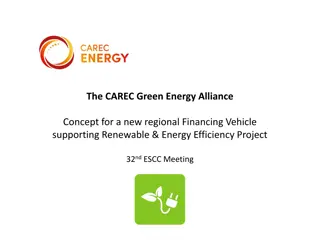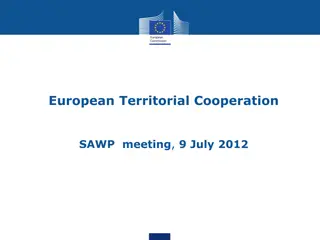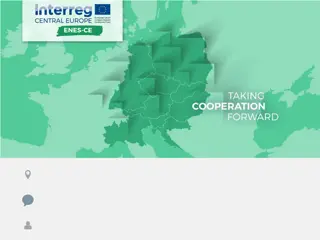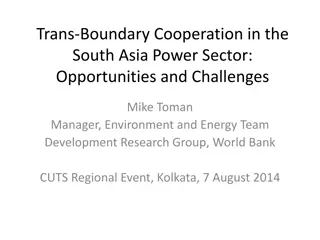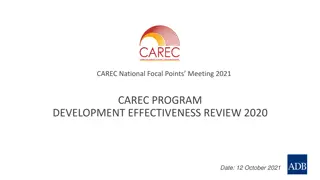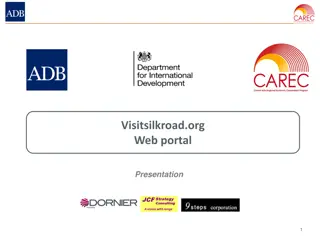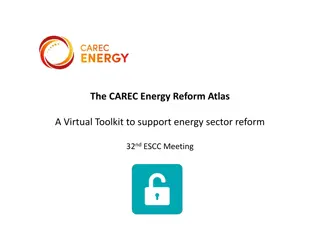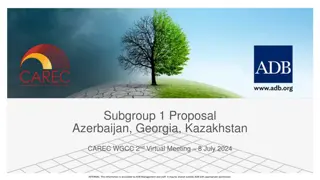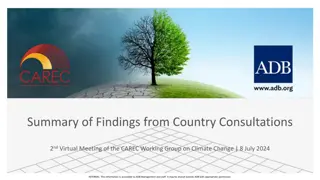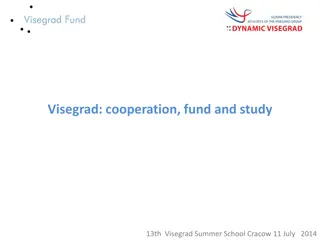Advancing Regional Cooperation on Skills Development in the CAREC Program
Strengthening Regional Cooperation on Skills Development under the CAREC Program is crucial for progress in the region. Challenges and opportunities for collaboration were discussed at the Inception Meeting and International Expert Roundtable in Tbilisi, Georgia. With 48 years of expertise, World Education Services (WES) plays a key role in promoting skills recognition globally, supporting inclusive economies, and aiding displaced individuals in obtaining credential evaluation reports. The international context of qualifications recognition, including conventions like the Lisbon Recognition Convention and UNESCO's Global Convention, further emphasizes the importance of skills development for international students from countries like Uzbekistan, Turkmenistan, Kyrgyzstan, and Kazakhstan studying in the U.S.
Download Presentation

Please find below an Image/Link to download the presentation.
The content on the website is provided AS IS for your information and personal use only. It may not be sold, licensed, or shared on other websites without obtaining consent from the author.If you encounter any issues during the download, it is possible that the publisher has removed the file from their server.
You are allowed to download the files provided on this website for personal or commercial use, subject to the condition that they are used lawfully. All files are the property of their respective owners.
The content on the website is provided AS IS for your information and personal use only. It may not be sold, licensed, or shared on other websites without obtaining consent from the author.
E N D
Presentation Transcript
Strengthening Regional Cooperation on Skills Development under the CAREC Program: Key Progress, Challenges, and Opportunities for Collaboration Inception Meeting and International Expert Roundtable 30 31 May 2022, Tbilisi, Georgia CAREC Region: Convergence Towards Bologna Process Beka Tavartkiladze Senior Director, Global Education and Knowledge World Education Services
Our Mission We help people learn, work, and thrive in new places. We help society recognize the value of people s education and experience. Our Vision Everyone is able to put their education, experience, and skills to work anywhere in the world.
48 Years of Experience and Expertise 2019 WES Mariam Assefa Fund launched to support catalytic leaders and organizations working to build inclusive economies 1998 WES launches its proprietary database, AICES (Automatic International Credential Evaluation System) 2021 75% of documents transmitted digitally and 486,000 evaluations completed 2017 Skilled Immigrant Integration Program begun 2012 WES Global Talent Bridge founded 1974 WES is founded: 20 evaluations completed 1984 4,700 evaluations completed 2000 WES opens an office in Toronto, Canada 2013 WES becomes a designated provider of educational credential assessments (ECA) for Immigration, Refugees and Citizenship Canada 2018 Launch of WES Gateway Program in Canada The program helps eligible individuals displaced by political unrest, conflict, and natural disasters obtain credential evaluation reports even when verifiable documents are not available
International Context of Qualifications Recognition Convention on the Recognition of Qualifications concerning Higher Education in the European Region (Lisbon Recognition Convention) UNESCO Global Convention on the Recognition of Qualifications concerning Higher Education
International Students in the U.S. - CAHEA 538 268 *Data from IIE: Open Doors 2020 2021* 1,830 328 Uzbekistan Turkmenistan Kyrgyzstan Kazakhstan
Overview of the Bologna Process: How and Why Why? How? Encouraging a common frame of reference, aimed at improving external recognition and facilitating student mobility as well as employability Adoption of a system of easily readable and comparable degrees Adoption of a system essentially based on two main cycles: undergraduate and graduate. Establishment of a system of credits: ECTS system Promotion of mobility and free movement of students, researchers, instructors, and staff Promotion of European cooperation in quality assurance with a view to developing comparable criteria and methodologies. Promotion of the necessary new dimensions in higher education
Overview of the Bologna Process: What Has Been Accomplished? Constructing the European Higher Education Area (EHEA) Enhanced cooperation of European higher education institutions (HEIs) Students and graduates in Europe have greater mobility and enjoy the full recognition of their qualifications and periods of study and have greater access to the broader European labor market The Bologna Process led to the creation of several remarkable tools: Developed a common qualifications framework ECTS Established common principles for the development of student-centered learning Set common standards and guidelines for quality assurance Enacted a common register of quality assurance agencies Detailed a common approach to recognition The process has inspired other regions of the world.
Bologna-Inspired Education Reform: CAHEA Kazakhstan Bologna Signatory Kyrgyzstan Not a Bologna signatory, but Bologna compliant Uzbekistan and Turkmenistan Neither is a Bologna signatory, nor Bologna compliant
Bologna-Inspired Education Reform: CAHEA Country Bachelor s and Master s Degrees ECTS Credits Kazakhstan Kyrgyzstan Turkmenistan Uzbekistan (soon) Source: WENR
Key Challenges Now and in the Future Parallel systems Professional Education Post-Soviet System of Education Reforms a la carte The introduction of the credit system Lack of harmonization
Prospects: Expansion Within the CAREC Region Sharing reform experiences through dialogue with interested parties outside the Bologna area. Collaborative partnerships that lead to mutually beneficial activity in areas of shared academic values between Bologna-compliant states and non-compliant countries. Promoting the appeal of mobility via ECTS: exchange and transferability.
Insights: Regional Solutions to Advancing Bologna-Inspired Education Reforms Institutions and government departments must work in a spirit of international cooperation . Work within CAREC states and with other stakeholders to promote the benefits Bologna-inspired education reforms. Promote best practices and lessons learned with other regions since the signing of the Bologna Accords . Support full recognition of qualifications and periods of study (automatic recognition ). Develop joint programs within CAREC states.
What Can We Do to Support Bologna- Inspired Processes in the Region? Bologna, three-year degrees, and what it means/meant for the U.S. Endorsing CAREC/CAHEA initiatives through credential evaluation Facilitating access to North American institutions and labor market for graduates from the CAREC Region Supporting and raising awareness of CAREC regional developments in North America through various platforms, including webinars, presentations, and articles
Thank you! Need more information? Visit: wes.org
